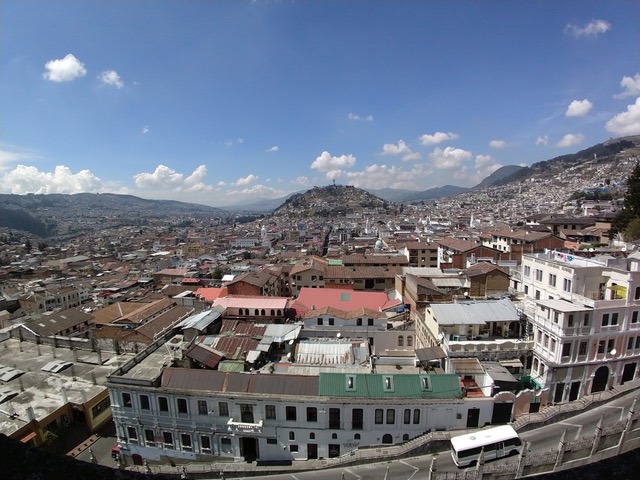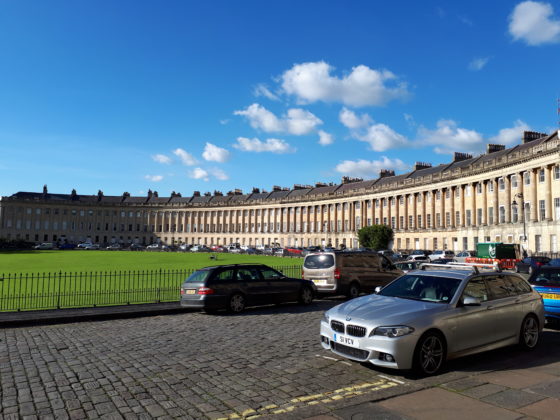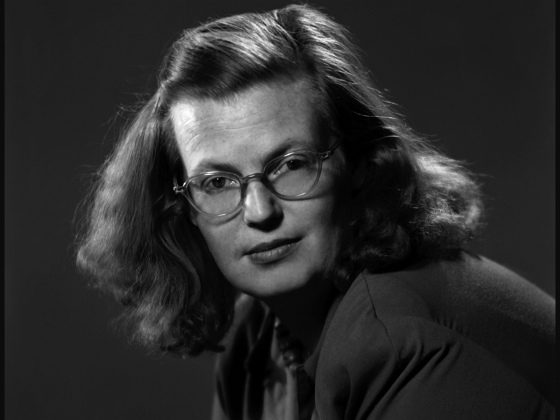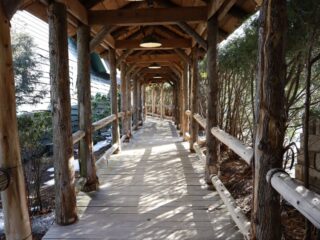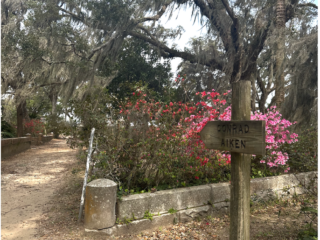by Ian N Arnof
We all know meeting our heroes isn’t a good idea. So many things can go wrong: stress from excitement, nervously speaking gibberish, not to mention being let down. I assure you when I quit my job, turned fifty years old, and set out to travel the world I was not expecting to meet one of my favorite authors. In fact, quite the opposite. My expectations were to meet everyday people around the world and to discover relationships in a completely new environment.
Quito, Ecuador’s capital city is extraordinary. Ecuador was the first country to be designated a World Heritage site with the Galapagos Islands. The architecture, museums, and the equator–latitude 00º 00’ 00” to be exact–are all lovely to experience.
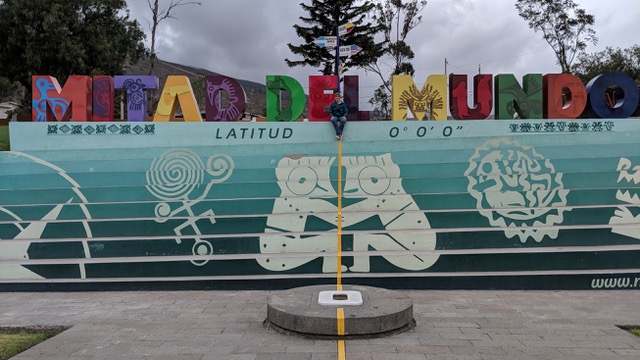
What’s extraordinary about the city though isn’t the usual tourist attractions; it’s the people. Unfortunately, my Spanish is abysmal so I can’t always rely on conversations while on the road. Therefore reading became a necessity.
Finding books in English requires some extra effort, so fortunately we found The English Bookshop. The fact that it was run by a kind, friendly, and knowledgeable English gentleman was a bonus. The bookshop owner, Mark, was prepared to help me find Haruki Murakami’s Men Without Women. Better still, he added critical information to my purchase.
Frankly, after visiting Machu Picchu, Lima, Arequipa, Trujillo, Chiclayo, Cusco and many other cities of Peru, after visiting the salt flats of Bolivia, after visiting Lake Titicaca and actually sleeping on the Isle of Sol, I simply thought Ecuador would be “blah,” a place to relax until we found our way to the Galapagos Islands.
Anything but, Quito, the country’s capital city, was a dream. We took a free tour of the city where we learned how Ecuadoreans murdered five of their former presidents. We drank fresh coffee and nibbled on the finest chocolate imaginable. South America was proving to be as amazing as I had hoped it would be.
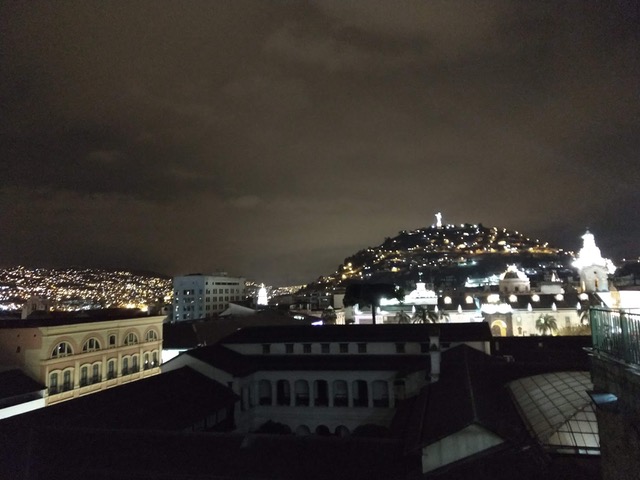
Back in the bookshop we discussed how I had longed to read Murakami for months. When traveling, the most luxurious thing we can do for ourselves is to have an actual book in our hands–not to say that e-reading isn’t lovely, but I grew up reading physical books–it’s decadent. Finding the English Bookshop I was elated. I was probably talking a mile a minute. I was so excited and relieved to have something enriching to read in those quiet moments when I wasn’t discovering the city.
The shop owner, Mark Halton, told me that when I came in asking for Murakami I had given him a chill up his spine. He revealed this was because Haruki Murakami was visiting Quito, actually South America, for the first time today and would be speaking across town. Then he ruffled through his paperwork and handed me a postcard with the information. Of course it was sold out months before, but Mark insisted: “Go anyways, this is Quito. Beg to stand in the back of the audience, they will make a space.” That was all the encouragement I needed.
My wife, Sunshine, indulges me and says she will join me in this endeavor. We are excited, spending the rest of the day touring the president’s home and chatting about the plans for the evening.
That evening the taxi across town was uneventful, just the way I like it. The auditorium was enormous. Crowds were beginning to form. My wife speaks Spanish so she made sure we were standing in the correct queue.
Chatting with Ecuadorian literary fans is hilarious and informative. Ecuadorians have stories of why they love reading Murakami, the first book of his they read, and how alluring the characters and plot lines are, noting that the magical realism added to the impossible familiarity they describe when opening the pages of a book that sings in the literary key that South American authors are renowned for. I don’t think it was a coincidence that Murakami chose Quito for his first appearance in South America. Ecuadorians’ love for poets is well established by Jorge Icaza, Jorge Carreras Andrade, César Davidila Andrade. The same is true for novelists like Luis Martinez, Demetrio Aguilera Malta, and Enrique Gil Gilbert.
On a deeper level, I think it is fair to say there is a connection between the Japanese and their relationship with China and Ecuadorians and their relationship with Peru. These are working people who had reasons to organize their culture and fight for their heartfelt beliefs. Those ideas made for a powerful emphasis on the language that binds them together. The literate crowd was buzzing as Murakami readers were waiting to see and hear a writer speak.
When we got to the front of the line we looked tired, dehydrated, and hopeless as we asked if we could purchase tickets. They told us, “Please go have dinner, come back in an hour and a half and check in with me. No promises OK?” Great! There’s a marginal chance; what more could we hope for?
Dinner was Quito’s delicious surprise. An outdoor cafe, Bai Tam’s vegetarian dishes came with multiple dipping sauces and beers. My wife kept calm as we walked back to the International Book and Reading Fair on November 8, 2018. The venue was a brand new state of the art metropolitan convention center. The talk was called “Literatura, Sexo, y Violencia.” At 8:25 pm we approached the man with the tickets at the window of the center. He said we owed a few U.S. dollars, less than twenty. Ecuador switched to U.S. dollars as their currency defaulted in 1999/2000. We happily took our tickets inside and found our seats.
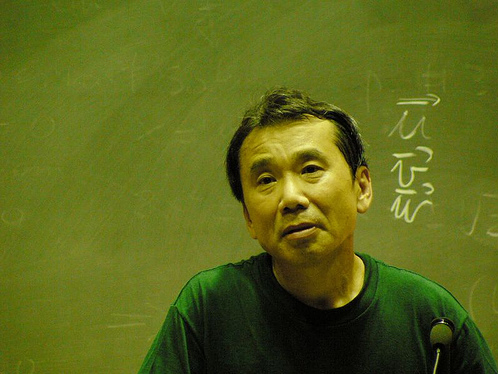
Haruki Murakami came out on the stage a few minutes later. Wearing a red collared button down shirt, grey hoodie, tan blazer, khakis, and blue running shoes with bright orange laces. He looked the part of a writer of our time. Huddled close to his interpreter, he listened for a long time while they discussed his work. It was in Spanish so I’m not certain I understood everything. Fortunately, Murakami answered all the questions he was asked in English.
The gracious wordsmith was surprised by the large crowd. He said he felt like Bruce Springsteen without the singing. Then he charmed the public with his witty, insightful observations of life and experiences. I’ve seen many writers speak publicly and it’s not usually like this, comfortable as if we were all sitting in the home of a dear friend. Murakami had a way about himself on stage, almost piteous, calm, and reassuring.
Speaking of his father (part-time Buddhist priest and teacher), his grandfather (full- time Buddhist priest), and his wife (keeper of his reality) Murakami opened up, describing his personal history, the process of writing, and the challenges of writing fiction.
Adding meaning to all of our lives, as if any one of us could write a novel, he encouraged us to understand the world of the subconscious. Going from this world to the other world and returning back was not as easy as it sounds.
Hours passed too quickly. Then we walked out of the building with the crowd. Murakami was sitting in the lobby signing books, taking pictures, and doing what one does as a modern day writer. We made the decision to not actually wait to meet him face to face. It just didn’t make sense. Without the time for a deeper conversation, I might feel cheated.
Haruki Murakami remains premier in my mind as I think of him writing at his desk daily. The writer describes his routine the way a farmer describes working the land. Murakami sees his job as one of manual labor. He wakes up early, goes for a run, has breakfast, but not too much, sits down to write for exactly five hours. Then stops mid-sentence at the five hour marker. The Murakami method works, so he’s not trying to change the structure that serves him well. Like a baseball player that does not change his socks on a winning streak. Murakami has confidence in making the work exceptionally accessible. His inviting words arise from poise, intention, and an unusual mindset. It’s as if Murakami is having an out of body experience combined with surgical precision. He chooses the words just so and lays them down gently.
My life changed a little bit on that day, just by watching a writer merrily sitting and answering questions of his audience. Why? At that moment the writer and his audience seemed a part of the same revelation. The unpredictable energy of this event, simply hearing how a writer crafts his language, had the power to transform us in ways we rarely anticipate. Part of this was the writer himself, but it would have been impossible without the receptive audience of Quitans, who connected with the writer so instinctively. At latitude 00º00’00” Murakami brought us back to the fundamentals of life and writing in the most magical way. Especially in these times when events can make us feel so disempowered, it’s important to remember to focus on the people and events around us. Just as in a novel, a small encounter can have a ripple effect that can change everything. I felt as if my evening with Marukami started much earlier, when I made the acquaintance of the bookshop owner Mark and enjoyed the experience of meeting ordinary Quitians.
Traveling is a way I have found to merge my ordinary life with extraordinary moments. Haruki Murakami, it was a pleasure listening to you speak and reading your novels while traveling around the world–perhaps next time we will chat face to face when travel becomes a thing again. As you taught me, travel and literature become extraordinary when we encounter the ordinary moments and people that turn our lives into our stories.
Ian Arnof is a teacher and loves to travel. Prior to the pandemic, he and his wife traveled around the world for a year. He lives in Somerville, Ma.

